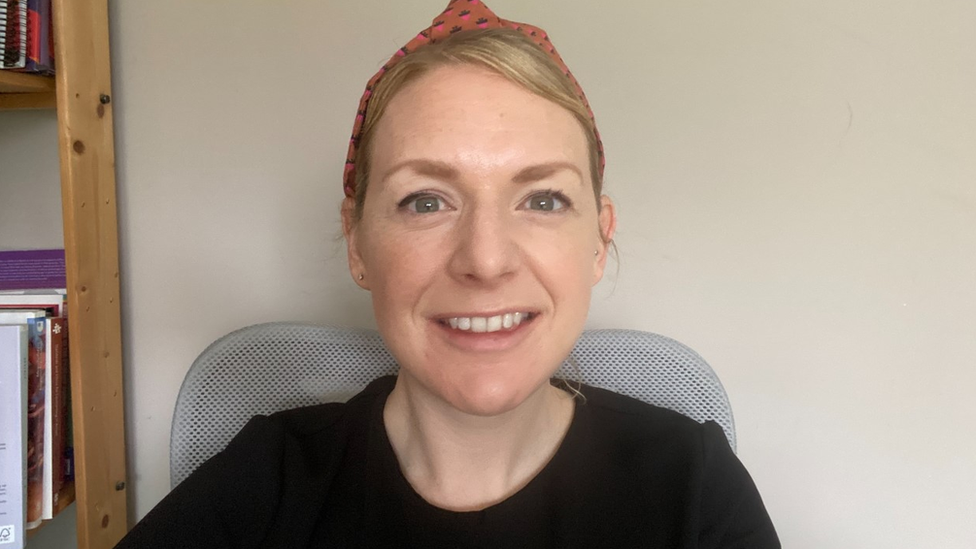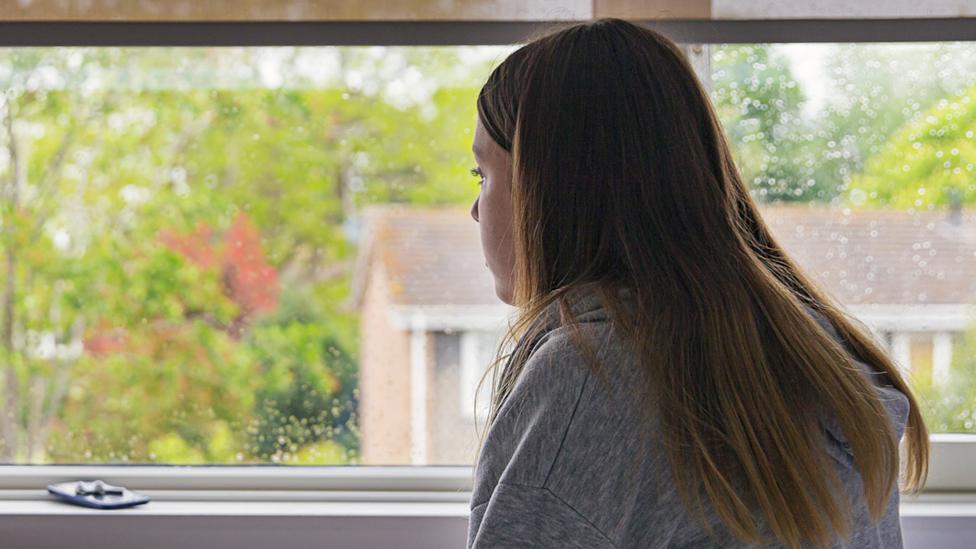Eating disorder hospital cases up 84% in five years in England
- Published

Too many young people have died from eating disorders when their lives could have been saved with early treatment and help, psychiatrists say.
New guidance, for all healthcare professionals across the UK sets out how to spot the signs of those at risk and how to best care for them.
Hospital admissions for people with eating disorders have risen by 84% over the past five years in England.
Charities said they were very concerned about the impact on all age groups.
The Royal College of Psychiatrists' medical emergencies in eating disorders guidance, external says all healthcare professionals, no matter where they work, are increasingly likely to come into contact with someone with a severe eating disorder who needs urgent care.
The Covid pandemic has made an already growing problem of eating disorders in young people even worse, with mental health charities saying lockdown, in particular, had a devastating impact on the most vulnerable.
The latest NHS figures, external show there were 24,268 hospital admissions for eating disorders in England in 2020-21 - up from 13,219 in 2015-16 - with the biggest increases in those aged 18 and under.
The large majority of those affected are young women, but admissions in young men have more than doubled in that time.

'It was terrifying to hear staff didn't know how to help'

James was admitted to hospital more than 20 times as a result of his eating disorders
James Downs, 32, developed anorexia when he was 15 after experiencing a number of mental health problems - but it was nearly seven years before he saw an eating disorder specialist, because there were none where he lived in south Wales.
"Nobody had the specialist skills to help me," he says.
When James ended up in hospital on a general ward, staff would openly tell him that nobody knew what to do.
"I was already in a crisis and very scared, but hearing that made me feel even more fear," James says.
"If they were panicking, it was quite terrifying for me."
James's health deteriorated over many years and, despite looking fit and well, he was admitted to hospital more than 20 times. Often this was with dangerously low potassium levels or heart issues - both consequences of malnutrition.
"It shouldn't have to get to that," he says.
Health professionals frequently didn't know what language to use around eating disorders and would often trivialise his problems.
And he found navigating the healthcare system while being forced to repeat his story to countless different people "tiring and really difficult".
"It comes down to training and awareness. Getting help early could prevent so many people from being admitted to hospital.
"We need informed care, not negative experiences."

Even when seriously unwell, people with eating disorders can appear to be healthy.
To help recognise those at risk, the guidance contains practical tools and treatment advice for everyone from nurses to physios, A&E doctors, GPs and dietitians, as well as carers and patients.
Psychiatrists started updating the guidance in 2019 after the "tragic cases" of three young people came to light, including 19-year-old Averil Hart, who died from anorexia in 2012 after collapsing at her university flat.



Dr Dasha Nicholls, an eating disorders psychiatrist for children and young people who led work on the guidelines, said eating disorders such as anorexia, bulimia and binge eating can affect people of any age and gender, and are not a lifestyle choice.
"They are mental health disorders, and we shouldn't underestimate how serious they are.
"Even though anorexia nervosa is often referred to as the deadliest mental health condition - most deaths are preventable with early treatment and support," she said.
The new guidance must reach healthcare professionals urgently, Dr Nicholls said, if the eating disorders epidemic is to be stopped "in its tracks".
Tom Quinn, from eating disorder charity Beat, said he hoped the guidance would "make a huge difference" because the sooner someone gets help, the better their chances of avoiding hospital admission and making a full recovery.
But he said he was "very concerned" about the rise in hospital admissions for eating disorders across all age groups.
He said the pandemic had had a huge impact on services that were already under strain.
"Front-line staff have been working tirelessly to support as many people as possible, but they cannot do so without adequate staffing and funding, which the government must make a priority," he said.
The Department of Health and Social Care in England said it was investing £53m in children and young people's eating disorder services - to increase capacity in 70 community support teams across the country.
It said a further £79m was being invested in children's mental health services so that at least 2,000 more children and young people can access eating disorder services.
If you've been affected by eating disorders, help and support is available via the BBC Action Line.

Are you or your family affected by issues covered in this story? Email haveyoursay@bbc.co.uk, external.
Please include a contact number if you are willing to speak to a BBC journalist. You can also get in touch in the following ways:
WhatsApp: +44 7756 165803
Tweet: @BBC_HaveYourSay, external
Please read our terms & conditions and privacy policy
If you are reading this page and can't see the form you will need to visit the mobile version of the BBC website to submit your question or comment or you can email us at HaveYourSay@bbc.co.uk, external. Please include your name, age and location with any submission.
- Published3 March 2022

- Published22 July 2021

- Published16 April 2022

- Published6 November 2020
